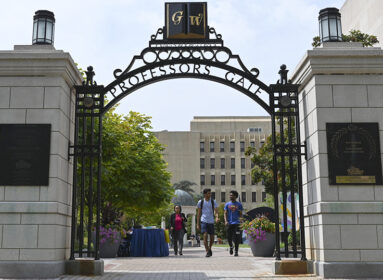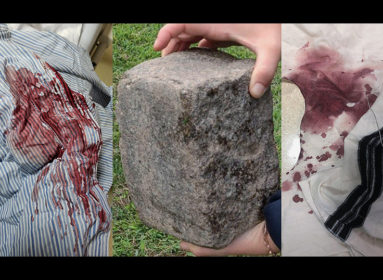By Cindy Mindell

At the “chocolate seder,” hosted by JSC at Westhill High School in Stamford, a student named Isabella reads the Hebrew Passover greeting written on a classroom blackboard.
In 1984, Congress passed the Equal Access Act, requiring public schools to provide equal access to extracurricular clubs. As a result, many student organizations like Bible-study groups and gay-straight alliances were born. It took nearly 20 years for the organized Jewish community to create its own response; in 2002, the National Conference of Synagogue Youth (NCSY) initiated JSU, an independent 501(c)3 organization dedicated to teaching Jewish culture to high-school students of all backgrounds.
JSU clubs were established by students at public high schools throughout the U.S., including Connecticut, staffed by adult NCSY employees. Two years ago, JSU leaders wanted to understand whether the organization was effectively conveying its “brand” to the Jewish teen marketplace. The name didn’t communicate the mission, and there seemed to be confusion as to whether the organization was geared toward the high-school or college population.
The national board was reorganized and a new name was selected. Jewish Student Connection is still dedicated to the original mission, says executive director and CEO Susan Wachsstock – connecting teens to their sense of Jewish identity, the Jewish community, and one other – but as an independent organization not affiliated with one Jewish movement. JSC maintains the same IRS-designated status as JSU. NCSY will continue to run its own JSU clubs.
“The name was changed in an effort to reach as many teens and their parents with our message,” she says: “helping students
complete their personal ‘canvas’ of Jewish identity and connect to their own Jewish future.”
A grant from the Jim Joseph Foundation allowed the organization to expand the development of clubs, staffed by full-time Jewish educators, to the Westchester-Connecticut and South Florida regions. As a provision of the grant, JSC opened offices in Port Chester, N.Y., which also serves as the national office; the organization is also active in the Chicago and Denver areas.
The newly reorganized Jewish Student Connection has been growing in the Connecticut area over the last two years, shepherded by area coordinator Rebecca Shapiro. JSC merged with the existing Israel Culture Club at Staples High School in Westport, opened new clubs at Westhill High School in Stamford, Newtown High School, and Masuk High School in Monroe. This fall, clubs will be launched at Stamford High School and Norwalk High School.
“We are always very clear that, while we are associated with a religion, our work is based on Jewish culture and heritage, like a French club,” says Wachsstock.
The Equal Access Act mandates that any extra-curricular clubs must be initiated by students, who enlist the support of a faculty member and then petition the school administration. JSC has been working with BBYO Connecticut Valley Region to meet teens who might be interested in starting clubs at their schools. Shapiro is also building relationships with area synagogues and other youth groups.
In addition to a venue for Jewish teens to explore their heritage, the clubs have proven to serve a wider purpose, Shapiro says. “Especially in areas with small Jewish populations, a lot of non-Jewish kids come to meetings to ask questions about Israel,” she says. “Some schools have courses on Israel that are lacking, and some students come to our club to learn the other side.”

Genna, president of the Masuk High School in Monroe JSC, and Josh president of the Westhill High School JSC in Stamford, with area coordinator Rebecca Shapiro.
Other schools are targeted in order to add a Jewish voice to the chorus of views from religious groups, to bolster the Jewish student population.
JSC adult facilitators represent strong Jewish identity across the Jewish denominational spectrum, Shapiro says. Some are rabbis; others are Jewish day-school graduates who want to work in Jewish education but haven’t yet pursued a higher-education degree. They are selected not only for the knowledge and experience from their respective Jewish backgrounds, but for their ability to discuss what other Jewish movements offer.
While JSC is crafting procedures and a program bank to standardize core aspects of the organization and share content, “fundamental to our approach is that you need to be reflective of the teens in a particular school, who are always at the center of the club,” says Shapiro. While JSC determines a list of topics to be covered in any given year, it is the students and facilitator at each school who decide how to approach the subject.
At Staples High School in Westport, for example, because JSC is linked to the former Israel Culture Club, a discussion on Tu B’Shvat focused on the importance of cultivating the Negev Desert with native tree species.
Shapiro says that she is constantly surprised by the stories behind students’ participation in JSC. “For months, I wondered why Frank [with an Italian last name] was coming to my club at Westhill High School in Stamford,” she says. “Then I read an article he had written for the school newspaper, describing how the club was a place where he could explore his Jewish heritage. I had no idea that he was Jewish.”
So far, JSC is only operating in public schools in Connecticut; private schools are not affected by the Equal Access Act and can decide whether or not to open a club based on their respective bylaws and values. Shapiro says that she is in discussions with two private schools in the Westchester-Connecticut region.
“We would love to be in some of the other schools in Fairfield County,” Shapiro says. “We’re seeing how much it means to the teens already involved.”
For more information: www.myjsc.org
Comments? Email cindym@jewishledger.com.







 Southern New England Jewish Ledger
Southern New England Jewish Ledger














